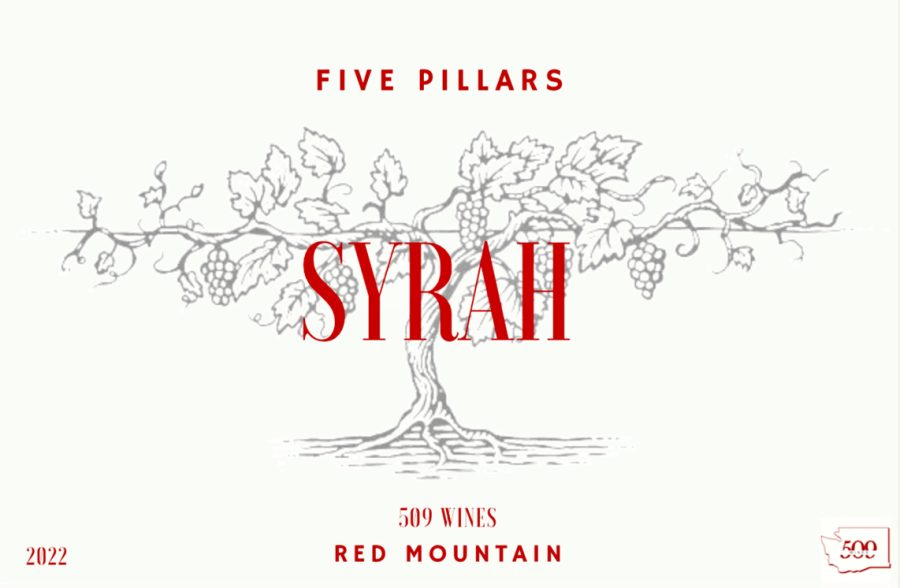WSU students win first place in annual wine competition
School of Hospitality Business Management students create wine idea called 5 Pillars.
COURTESY OF CALIE JUDKINS, MARK BROOKS, ADRIAN AU, MATTIE MAUSETH, AND JENNI KOWAL
Five Pillars is the wine idea that won the team first place.
January 16, 2023
A WSU team took home the Byron Marlowe Memorial Trophy in December after winning first place in the Intercollegiate Wine Business Invitational.
The team, which went by their company’s name 509 Wines, included Calie Judkins, Mark Brooks, Adrian Au, Mattie Mauseth and Jennifer Kowal, said Robert Harrington, School of Hospitality Business Management director and professor.
The team, who are part of the School of Hospitality Business Management submitted a wine idea called 5 Pillars, which is a Syrah Viognier, or a blend of red and white grapes, said Brooks, senior wine and beverage business management major.
“We selected our fruit from Red Mountain and named it 5 Pillars because it is said there are five pillars that make up Red Mountain,” Brooks said. “…we believe that Red Mountain has some of the best-growing conditions for Seraph, and we wanted to highlight that through our wine.”
WSU started competing in the virtual competition five years ago. Former WSU professor Byron Marlowe created the program with the idea of intercollegiate competition, Harrington said.
After his passing in December 2021, Carson College at WSU Tri-Cities honored Marlowe’s legacy by naming the award after him, according to the official e-newsletter of the WSU School of Hospitality Business Management.
Students competing in the competition created an idea and develop a business plan for sales and marketing—an elaborate fiscal plan. Harrington said that the teams created a wine label that satisfies legal requirements and is aesthetically pleasing.
“[Students] submit all that in working groups to develop it and then compete again,” Harrington said. “They have a group of judges from the [wine] industry read all the proposals for a new wine brand. Then they rent rank [the proposals] and award for a second or third place to teams competing.”
Students met during the semester to work on their projects and attend sessions focused on the competition. These sessions, held by master winemaker Tim Hanni, who has been in the business for over 50 years, are open to all student groups and faculty members competing, he said.
Students submit their business plan, financial analysis, wine label and other requirements to a designated Google Document folder. There is a 10-day waiting period between submission and results. He said that judging occurs toward the end of November, with winners announced in December.
Brooks said his favorite part of the competition was the initial idea generation. One of his key takeaways is seeing the effort that goes into producing, marketing and selling a bottle of wine.
“There is more in one bottle than most people realize,” he said. “They see the physical bottle at the store, restaurant or wherever; but do not realize the amount of time and effort put into getting that bottle in front of you. It made me appreciate winemaking a lot more.”
— Mark Brooks
Judkins, a senior wine and beverage business management major said her favorite part of the competition was finding out her team won. She was also honored to receive the Byron Marlowe Memorial Trophy.
Harrington said the key takeaways are before the competition, where students get involved and have the chance to integrate their knowledge into their product.
“[The competition] gives them a chance to integrate all the things that they have learned about wine and marketing, branding and strategic planning into what would feel like a real-life plan for [their] wine brand,” he said. “That gives them a much stronger proficiency in their skill sets when they go out in the job market.”
Harrington integrated the competition into his Food and Beverage Analysis class (HBM 490). Every fall semester, students work on their submission, as the competition is a class requirement, Harrington said.
“The class focuses on innovation in food and beverage, so students come up with an idea related to food and, or beverage, and then they go through a process of determining actual upper business opportunity, he said. “They spend two semesters working on their idea in a group…”
Two members of the 5 Pillars team graduated last semester, and the remaining are finishing up their capstone classes so they can graduate in the spring. They are also working in a different group with the same people and some new members, Brooks said.















